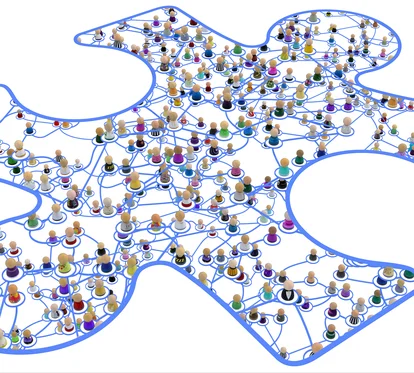What does all this mean for the central organization? Does it disappear over time?
Paul: “That is neither feasible nor desirable. You want national security, for example, regulated at the state level. The same goes for diplomacy. You have to keep in touch with other countries from the central body. Another example is public transportation. Trains need rails to run. And things that are just there in the real environment, the physical world, and owned by the public, need a central regulatory body.”
Edwin: “It is currently prevalent to think, to philosophize, about a world without states. After all, what is a state? Not much more than a line drawn with a stick in the clay soil. In fact, we are simply one planet. But as long as there are artificial, legal states, we do have to take care of state affairs and protect 'our' state from 'the other'. This lies as a responsibility at the central level. An entirely decentralized army (cells), for example, would be impractical for defense, unless you are fighting a guerrilla war. Yet there are also many parts of our society that are not state-based and function on their own. If we don't have a government for two years, for the most part the Netherlands will continue to function as usual. A lot of centrally regulating bodies, interest groups and umbrella organizations should actually go from policy-making to facilitating. Just like Wikipedia. In fact, that platform does nothing but facilitate. ”
Can you give an example of successful decentralization?
Paul: “Decentralization at the state level is very difficult. Central bodies often tend to keep power to themselves unless there is a large-scale need for it. Sometimes it even takes a revolution to make it happen.”
Edwin: “Making money programmable through blockchain technology is an example of successful decentralization. In Third World countries, people don't always have the right papers to do banking. Now they have a decentralized organized form of money that no longer goes through a bank. In fact, for coins, all you need is a smartphone and the internet. Even sending money, which takes place all over the world, becomes much easier with virtual money. And make no mistake: blockchain is a technical architecture that offers countless ways to improve relationships. Even on a human level. I would even argue that programmable money can bring back the human touch to local relationships. This form of money can contribute to smarter and longer-lasting business relationships between municipal residents and local providers.”
Paul: “Another example of successful decentralization at the micro level is a WhatsApp group that neighborhood residents use to keep each other informed about what is happening in the neighborhood. This was created decentrally and does not involve the police or the mayor. The only thing the government does is facilitate the signs that say Attention Neighborhood Prevention.”
Edwin: “And this, of course, is just the beginning. Over time, thanks in part to a technology like blockchain, more and more local initiatives will emerge. The future is local!”
Onderaan artikel: Keep an eye on Insights for parts 2 and 3 of this series on decentralization.
Do you find blockchain interesting, but lack certain basics? Then read the article What is blockchain?



